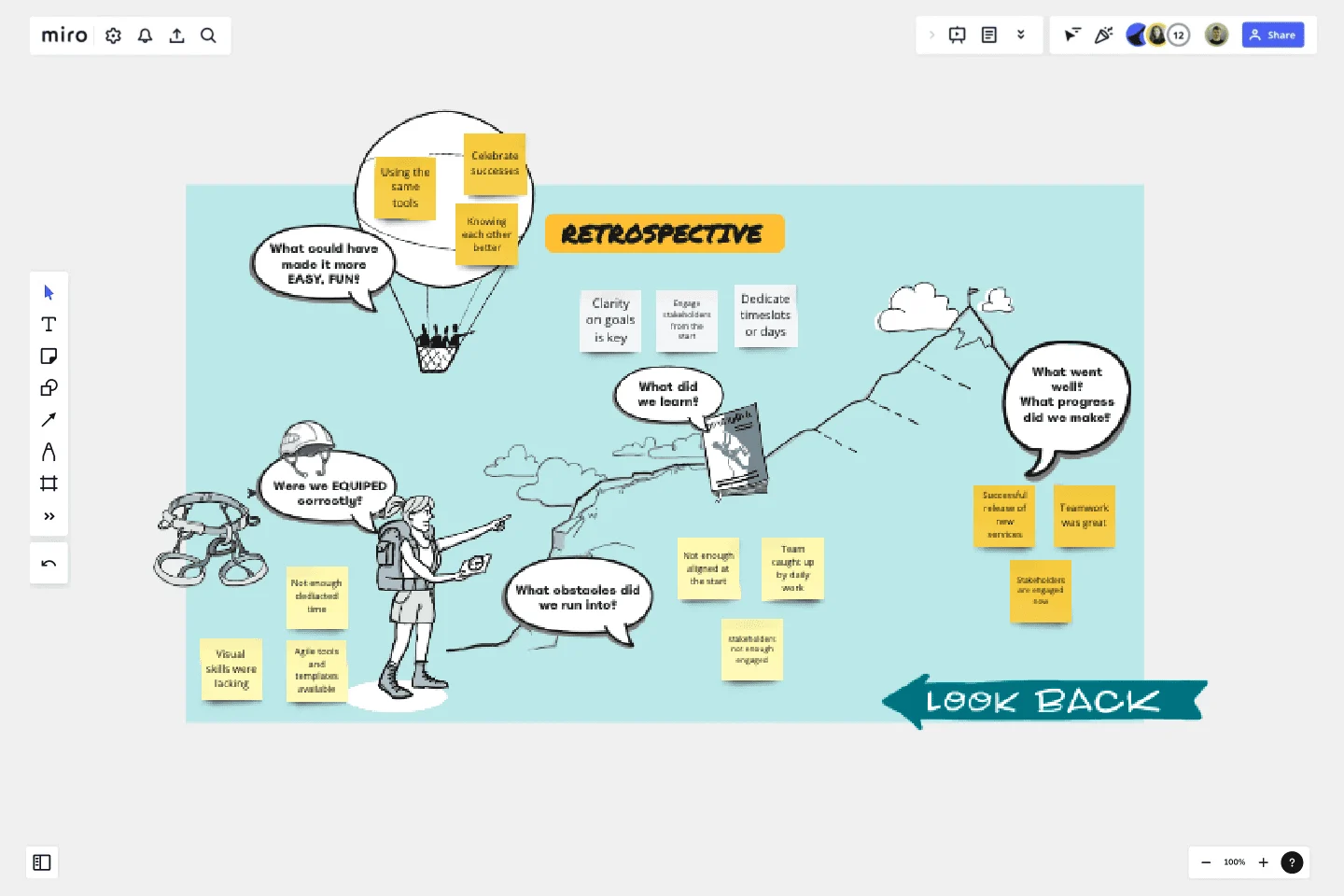Retrospective by Axelle Vanquaillie
Retrospective means looking back. This retrospective template helps teams to reflect on what worked well, what didn't work well, and what they learned. In this template, we added a few other aspects, more specifically, the equipment, the atmosphere, etc...
The value of a retrospective lies in the initiatives and actions that follow the reflection and improve the team's performance sustainably.
5 tips for running a retrospective meeting:
1. Install a safe environment. Like with every team reflection exercise, ensuring a climate of psychological safety is crucial. Make sure everyone is and feels involved. Focus on learning and not on blaming. And agree on the confidentiality of the meeting: what happens there stays there.
2. Organize individual reflection and allow people to talk in pairs first before sharing with the larger group. Discuss the pain points, learnings, achievements, etc... theme per theme, and make sure every voice has been heard.
3. Start with the aspects that went well. Starting strong brings positive energy and helps you through the harder nuts to crack.
4. Help the team switch from problems to solutions by defining the learnings immediately after framing the obstacles.
5. Go from solution to action. Agree on which steps need to be taken and hold each other accountable. Make the actions and next steps feasible so you can celebrate successes.
This template was created by Axelle Vanquaillie.
Get started with this template right now.
Starfish Retrospective
Works best for:
Retrospectives, Agile Methodology, Meetings
The Starfish Retrospective template offers a structured approach to retrospectives using the metaphor of a starfish. It provides elements for identifying what to start, stop, continue, do more of, and do less of. This template enables teams to reflect on past iterations, identify actionable insights, and prioritize improvements. By promoting clarity and focus, the Starfish Retrospective empowers teams to drive meaningful change and continuous improvement effectively.
Rose, Bud, Thorn Template
Works best for:
Retros, Agile
The Rose, Bud, Thorn template is a structured method for team reflection and feedback, designed to help teams identify positive aspects, potential opportunities, and challenges within a project or situation. One key benefit of using this template is its ability to promote balanced feedback and productive discussions, which can lead to improved team processes and outcomes.
The Hot Air Balloon Retrospective
The Hot Air Balloon is a simple activity for helping the team identify things that makes them move faster, and things that slow them down.
Canvas Playground Template
Works best for:
Templates
The canvas playground template is the ultimate way to explore all the features that make up Miro's Intelligent Canvas. This dynamic and interactive space is designed to help you get work done faster while engaging your team. From AI creation and Sidekicks to intelligent widgets, this template allows you to try it all and discover how these capabilities can streamline your workflow and enhance collaboration.
Project Retrospective
Works best for:
Retrospectives, Agile Methodology
The Project Retrospective template offers a structured approach for teams to review project performance and identify areas for enhancement. It provides elements for reflecting on project goals, milestones, successes, and challenges. This template enables teams to evaluate project outcomes, learn from experiences, and implement process improvements. By promoting reflection and accountability, the Project Retrospective empowers teams to optimize project delivery and drive continuous improvement effectively.
Meeting Reflection Template
Works best for:
Meetings, Brainstorming, Team Meetings
When schedules get hectic, “learning by doing” becomes the default way to learn. So make time for your team to learn in other valuable ways — by reflecting and listening. Led by “learners,” (team members who share with the rest of the team), a meeting reflection lets teammates share new information about a client’s business or an internal business initiative, offer problem-solving techniques, or even recommend books or podcasts worth checking out. Meeting reflections also encourage colleagues at all levels to engage in each other’s professional development of their teammates.
